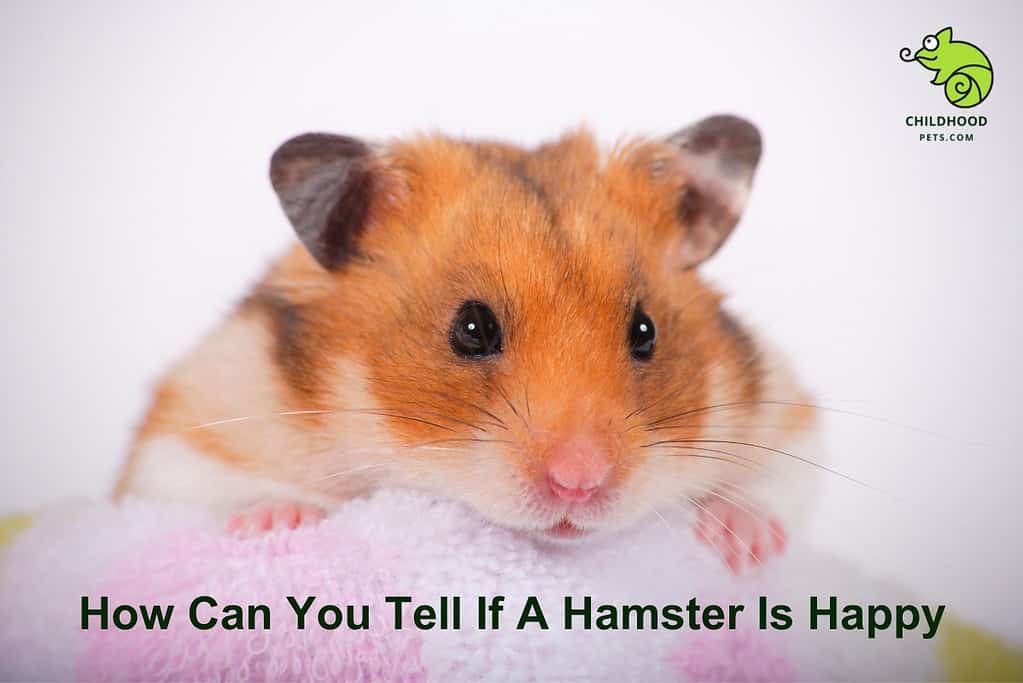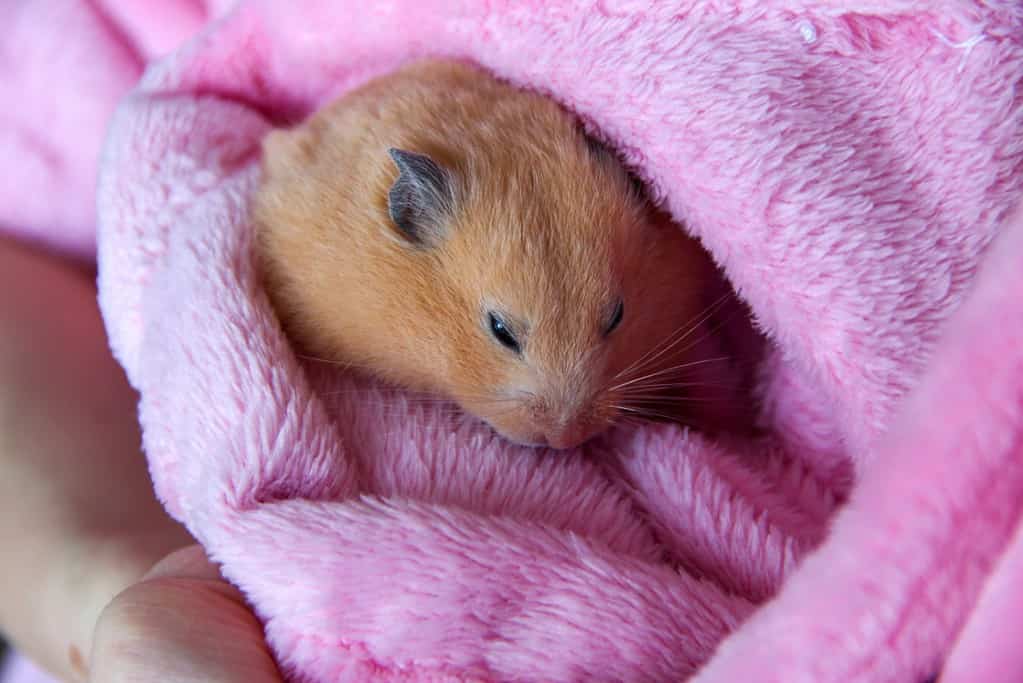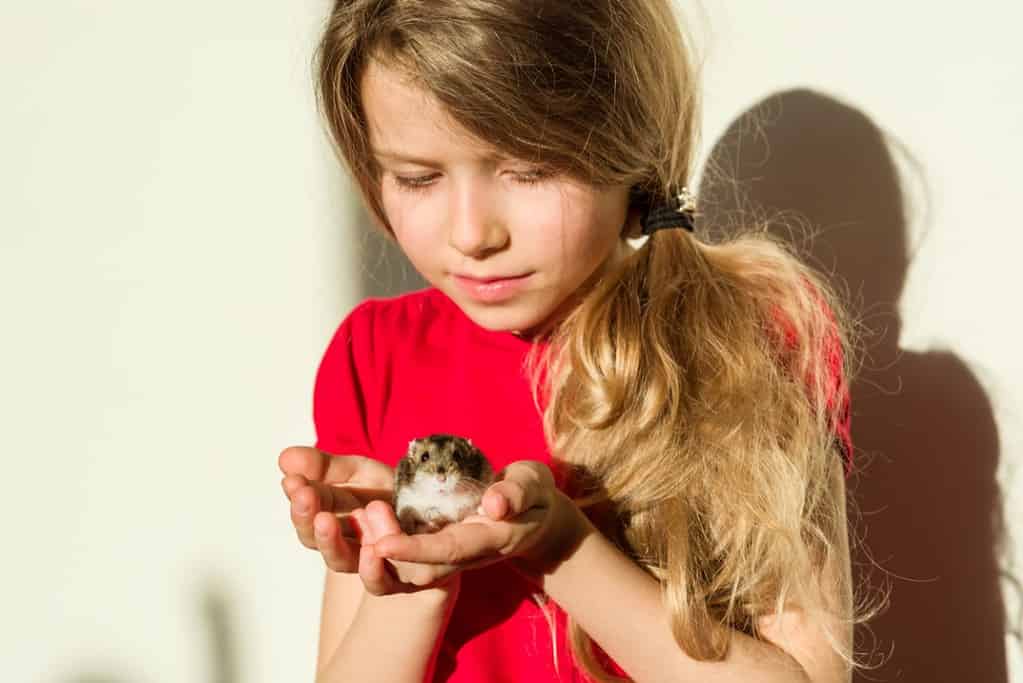
Hamsters make great pets for their friendly companionship. It’s important to keep our adorable little furballs content and happy, so it’s essential to understand the signs of a satisfied hamster. But how can you tell if your hamster is feeling happy?
As a general rule, a happy hamster will usually appear content with handling and playing, be alert and attentive, have a clean fur coat, maintain a healthy weight, show a good appetite, play with toys, and have normal sleep habits. They also enjoy exploring their environment and engaging in exercise.
In this article, we will discuss some of the signs that you can look for to tell if your hamster is happy. So without further ado, let’s take a closer look at what these signs could be!
8 Subtle Signs Of A Happy Hamster
Hamsters make great pets, and it is important to look for signs of contentment in order to ensure their well-being. Here are some key indicators that your hamster is content. The more of these signs you spot, the happier your hamster is likely to be.
1. Contentment with Handling and Playing
A happy hamster will be content when being handled, and it will also enjoy playing with its owner. They should not become stressed or scared when they are held but instead should show signs of curiosity and pleasure. It may even make quiet chirping noises as a sign of pleasure.
2. Active and Alert
A healthy, happy hamster will be very active and alert. It should enjoy exploring its environment, playing with toys, and foraging for food. You may also see it digging and rearranging its bedding material which is a sign that it feels content in its home.
Hamsters are nocturnal creatures, so they may be more active at night but should still be alert and engaged during the day. If your hamster is lethargic or uninterested in its environment, it could be a sign that it is not content.
3. Clean Fur Coat
Hamsters groom themselves often and enjoy keeping their fur clean and tidy. A healthy hamster will have a glossy, clean fur coat. It should be free from matted clumps of fur and dirt, which could indicate poor grooming habits or a lack of interest in its environment. If your hamster is not keeping its coat as clean as it should be, this could indicate that it is unhappy.
4. Healthy Weight
A healthy hamster will maintain a consistent weight and not appear too skinny or overweight. If you notice your hamster looks like it has gained or lost a significant amount of weight, then it could be a sign that something is wrong.
5. Good Appetite
Hamsters with a good mood will usually have a healthy appetite, and they will eat all of the food that has been given to them. Generally, happy hamsters will be quite enthusiastic when it comes to their food, and they will consume it quickly. This is usually a sign that they are feeling content in the environment that they are currently living in.
6. Normal Sleep Habits

Hamsters like to sleep during the day and stay up at night. However, they should not be sleeping excessively in either direction. If you notice your hamster sleeping more than usual, it may be a sign of depression or illness.
7. Playing With Toys
Hamsters love to play with their toys! If they are actively engaging with the toy, like squeaking, nibbling, or pushing it around, then they are likely having a good time. Signs of happiness can also include purring and even running on the wheel. These behaviors indicate that your hamster is feeling happy and relaxed in their home.
8. Enjoyment of Exercise and Exploration
When happy, hamsters will enthusiastically explore their surroundings and engage in regular exercise. They’ll be full of energy and curiosity during playtime, a sure sign that they feel content and secure. If you notice such signs, your hamster is likely very happy.
How Can I Tell If My Hamster Is Not Happy?
Hamsters can be notoriously difficult to read, but there are a few key signs that your hamster may not be feeling its best. Some of these include changes in behavior and physical appearance. Here are some signs to look out for that may indicate your hamster is unhappy.
- Signs of stress, such as hunching over and not wanting to interact with humans or other animals, can indicate unhappiness in your hamster.
- If your hamster displays aggressive behavior like biting when handled or trying to escape, this could be a sign that it is unhappy.
- Lack of energy or enthusiasm in playing, eating, and performing other activities is an indication that your hamster may be feeling down.
- If your hamster has stopped grooming itself as much, this could also indicate sadness.
- Reduced appetite, a decrease in water consumption, and increased sleeping hours can all be signs of unhappiness in hamsters.
- Changes in behavior, such as pacing or hiding more than usual, can also be signs that your hamster is not feeling content and happy.
What Can I Do To Ensure My Hamster Is Happy?

When it comes to hamster care, ensuring your pet is happy and healthy should be a top priority. There are several steps you can take to make sure your hamster is having the best life possible.
1. Provide Adequate Space
Hamsters need plenty of room to run and explore. A large wheel, bedding, toys, tunnels, and other accessories should be provided in the cage. Make sure your hamster’s home is cleaned regularly and that there is enough ventilation and light.
2. Ensure Proper Nutrition
Feeding your hamster a balanced diet is essential for its health. Provide them with plenty of fresh vegetables, fruits, and grains, as well as high-quality lab blocks or seed mix. Avoid giving your hamster too many sugary treats and processed food.
3. Stimulate With Toys And Activities
Hamsters love to run and play, so providing them with plenty of toys and activities is important. Wooden blocks, tunnels, chew sticks, and balls are great ways to keep your furry friend active and engaged.
To ensure your hamster never gets bored, try changing up the selection of toys every few weeks. This will give them something new and exciting to explore.
4. Offer Regular Handling And Socialization
Handle your hamster regularly, providing it with frequent socialization to build a trusting bond. Be gentle – sudden movements or loud noises can startle them. With patience and care, you two will form a lasting connection.
Wrapping Up
Your hamster’s happiness is essential for its health and longevity. Make sure they have a spacious enclosure, nutritious food, enriching toys, regular handling, and socialization – then you can ensure your pet has a safe and enjoyable home. With the right care and attention, you can keep your hamster content for years to come.
If you have any tips or tricks for keeping your hamster happy and healthy, we’d love to hear about them in the comments!
Frequently Asked Questions
What is normal hamster behavior?
Normal hamster behavior varies from individual to individual but generally includes running on its wheel, foraging for food in its habitat, and exploring objects in its environment. They should be active during the day and sleep at night. Hamsters also like to groom themselves with their paws and use their teeth to chew on things.
How do hamsters show you affection?
Hamsters can show affection by running to you when they hear your voice, snuggling up to you when being held, and sniffing or licking your hand. They can also recognize their owners through smell and may become excited when they see them.
Do hamsters like being in a cage?
Yes, hamsters generally feel safe and secure in their cage. However, it is important to provide them with plenty of space to explore and access to toys and other objects that are enriching for their environment.
Do hamsters like being in a ball?
Some hamsters may enjoy being in a ball, while others may not. It is important to monitor your hamster when they are in the ball and ensure that it isn’t too big for them to move around easily. If your hamster seems stressed or anxious, it is best to avoid using the ball.
